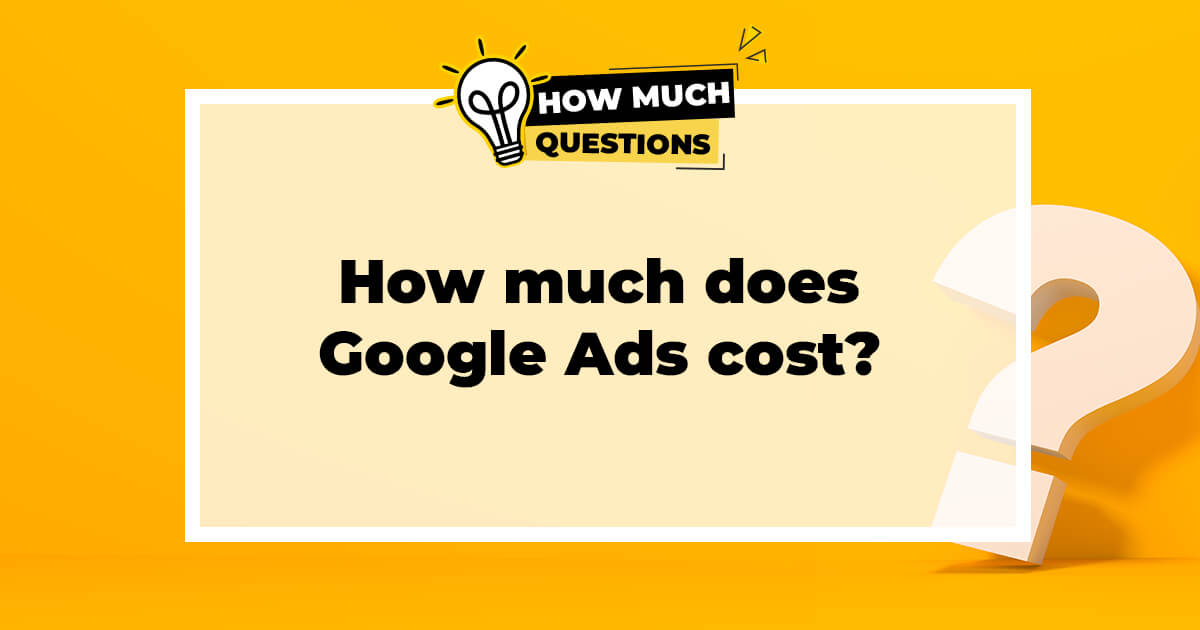How much does Google Ads cost?
Discover the true cost of Google Ads and learn how to optimize your spending.

Introduction
In the digital age, where competition is fierce and attention spans are short, mastering Google Ads can be a game-changer for your business. But before diving in, you must answer a crucial question: How much does Google Ads cost? In this comprehensive guide, we will break down the factors that influence Google Ads pricing, provide cost-saving tips, and offer guidance to make optimal choices.
How Much Does Google Ads Cost?
The cost of Google Ads varies based on several factors including bidding strategy, competition, and targeted keywords. On average, businesses spend between $9,000 to $10,000 per month on their Google Ads campaigns. However, small businesses might spend as low as $1000 per month, while larger enterprises might invest over $30,000. It's essential to note that Google Ads operates on a pay-per-click (PPC) model, meaning you only pay when someone clicks on your ad. The average cost-per-click (CPC) ranges from $1 to $2 for the Search Network and less than $1 for the Display Network. Setting a clear budget and monitoring your campaign's performance can help optimize costs.
Factors Influencing Cost
1. Keywords Selection
One of the primary factors affecting your Google Ads expenditure is your choice of keywords. High-competition keywords will naturally cost more per click (CPC). We'll delve into strategies for selecting the right keywords for your budget.
2. Quality Score
Google rewards well-structured, relevant ads with a higher Quality Score, which can lower your CPC. We'll discuss how to optimize your ad copy and landing pages to improve this vital metric.
3. Bidding Strategy
Your bidding strategy determines how much you pay for clicks. We'll explore various bidding options, such as manual CPC and automated bidding, helping you choose the best approach for your campaign goals.
4. Ad Placement
The position of your ads on the search results page affects costs. We'll explain how ad placement works and offer insights on finding the sweet spot between visibility and affordability.
5. Geographic Targeting
Google Ads allows you to target specific locations, and the cost can vary significantly based on geography. We'll provide strategies for optimizing your geographic targeting to maximize ROI.
Pre-Purchase Considerations
1. Budget Allocation
Before launching your Google Ads campaign, set a realistic budget that aligns with your marketing goals. We'll help you calculate a budget that suits your business.
2. Audience Analysis
Understanding your target audience is crucial. We'll guide you in creating buyer personas and tailoring your ads to appeal to your ideal customers.
3. Competitor Analysis
Researching your competitors can give you a competitive edge. We'll show you how to spy on your rivals and use the data to fine-tune your strategy.
4. Landing Page Optimization
Your landing page can make or break your campaign. We'll discuss best practices for optimizing your landing pages to increase conversions and reduce ad spend.
Cost-Saving Tips
1. Negative Keywords
Identify and exclude irrelevant keywords to prevent wasted clicks and save money.
2. Ad Scheduling
Schedule your ads to run during peak hours when your target audience is most active.
3. Ad Extensions
Use ad extensions to enhance your ad's visibility and value without increasing costs.
4. A/B Testing
Constantly test and refine your ad copy and landing pages to improve performance and reduce CPC.
Guidance for Optimal Choices
To make the best decisions for your Google Ads campaign, consider the following:
- Regularly monitor and adjust your campaign based on performance data.
- Invest in ongoing keyword research to discover new opportunities.
- Experiment with ad formats, such as video or display ads, to diversify your approach.
- Seek professional advice or consider hiring a certified Google Ads expert for complex campaigns.
Conclusion
In conclusion, understanding how much Google Ads costs is essential for any successful online advertising campaign. By considering factors like keyword selection, Quality Score, and ad placement, as well as following pre-purchase considerations and cost-saving tips, you can optimize your Google Ads budget and drive meaningful results for your business.
Remember, this article provides valuable insights, but it's essential to seek professional advice tailored to your specific situation. Feel free to leave comments or questions below, and we'll be happy to assist you on your journey to Google Ads success.
FAQ: Frequently Asked Questions
How is the cost of Google Ads determined?
The cost of Google Ads is determined by several factors, including the competitiveness of your keywords, your bidding strategy, the quality score of your ads and landing page, and the targeted geographic location. Google Ads operates on a pay-per-click (PPC) model, meaning advertisers only pay when someone clicks on their ad.
What is the average cost-per-click (CPC) on Google Ads?
The average cost-per-click (CPC) on Google Ads varies based on the industry and the keywords targeted. On average, the CPC ranges from $1 to $2 for the Search Network. However, for highly competitive industries or keywords, the CPC can be significantly higher.
Can I set a daily budget for my Google Ads campaign?
Yes, Google Ads allows advertisers to set a daily budget for their campaigns. This ensures that you won't spend more than you've allocated for a specific day. Once your daily budget is reached, your ads will stop showing for that day and resume the next day.
How can I reduce the cost of my Google Ads?
To reduce the cost of your Google Ads, consider optimizing your ads for a higher quality score, refining your keyword list to target more specific and less competitive keywords, and improving the relevance and user experience of your landing pages. Regularly monitoring and adjusting your campaigns can also help in cost optimization.
Is there a minimum spend for Google Ads?
No, there is no minimum spend requirement for Google Ads. Advertisers can start with any budget they're comfortable with. However, it's essential to set a budget that aligns with your advertising goals and the competitiveness of your industry.
How does Google Ads' bidding system work?
Google Ads uses an auction system where advertisers bid on keywords relevant to their business. When a user searches for a keyword, Google determines which ads to display based on the bid amount, ad relevance, and quality score. The highest-ranking ads get displayed on the search results page.
Are Google Ads worth the investment?
Google Ads can be a worthwhile investment for many businesses. They offer a direct way to reach potential customers actively searching for products or services. With proper optimization and targeting, Google Ads can drive significant traffic and conversions.
What's the difference between Google Ads' Search and Display Network?
The Google Ads Search Network targets users actively searching on Google, while the Display Network targets users browsing websites, videos, and apps that show Google ads. The Search Network is more intent-driven, while the Display Network is more about brand awareness.
Can I target specific locations with Google Ads?
Yes, Google Ads allows advertisers to target specific geographic locations, from countries to cities to a radius around a specific location. This feature is beneficial for local businesses or those looking to target a specific market.
How often should I review and optimize my Google Ads campaigns?
Regular monitoring and optimization are crucial for the success of any Google Ads campaign. It's recommended to review campaign performance at least once a week and make necessary adjustments to keywords, bids, ad copy, and landing pages.
If you want to know other articles similar to How much does Google Ads cost? you can visit the category Advertising and Marketing.
- Introduction
- How Much Does Google Ads Cost?
- Factors Influencing Cost
- Pre-Purchase Considerations
- Cost-Saving Tips
- Guidance for Optimal Choices
- Conclusion
- FAQ: Frequently Asked Questions
- How is the cost of Google Ads determined?
- What is the average cost-per-click (CPC) on Google Ads?
- Can I set a daily budget for my Google Ads campaign?
- How can I reduce the cost of my Google Ads?
- Is there a minimum spend for Google Ads?
- How does Google Ads' bidding system work?
- Are Google Ads worth the investment?
- What's the difference between Google Ads' Search and Display Network?
- Can I target specific locations with Google Ads?
- How often should I review and optimize my Google Ads campaigns?


Leave a Reply